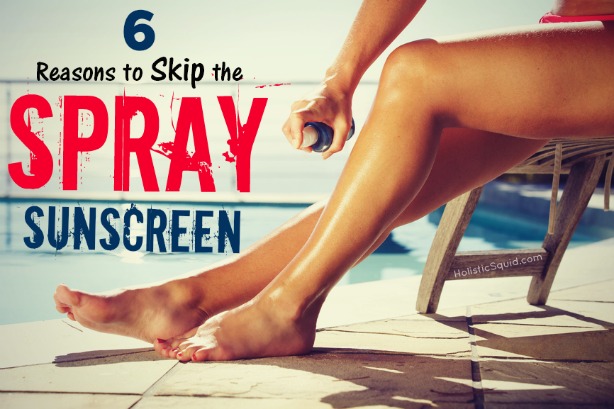
This is a public service announcement: please, please stop spraying that nasty spray sunscreen at the beach, at the pool, anywhere. Thank you.
I get it. They're convenient. No more rubbing in pasty white cream all over yourself and your kids. No more sand sticking to every surface of your body. All this in a handy-dandy spray.
But just maybe, if you took a quick minute to think about the why-nots, you may agree with me…
Here are 6 reasons to skip the spray sunscreen for good:
#1 – You actually need sun exposure
I can't tell you how many times I watch diligent parents spraying down their kids at the beach or pool when the sun is already low in the sky.
We live in such a sun-fearing culture, we've forgotten that we actually need sunshine for good health. Direct sunlight on the skin is our bodies' best way to generate vitamin D – essential for healthy bones, teeth, immune function, hormone production, good mood, and so much more. Contrary to common belief, sunshine has actually been shown to prevent certain cancers – including melanoma.
Of course, sunburn is never a good thing. So if you're going to be out for long periods when the sun is at its peak, you may need to wear a natural sunscreen plus protective hats and clothing.
You can read more about the health benefits of sun worshipping here.
For more information on healthy sunscreens, skip down to #6 below.
#2 – You don't want poison sprayed on every exposed surface of your skin
The sun shielding ingredients in spray sunscreen are non-biodegradable chemicals, many of which are carcinogenic and/or act as hormone disruptors – as reported by the Environmental Working Group (EWG), an organization that methodically tests and rates ingredients in body care products.
Chemical sunscreens soak into the skin and are designed to absorb harmful UV rays before they can damage the skin. Among others, these ingredients include: PABA, oxybenzone, cinnamates, salicylates, triethenolamine, and benzophenones. Since chemical sunscreens are absorbed into the body, their ingredients are found in plasma as well as urine samples after use in humans.
When UV rays are absorbed by the skin, they can generate reactive oxygen species (ROS), the harmful compounds that can cause premature aging and skin cancer. When absorbed into deep skin layers, chemical compounds in sunscreen can actually react with UV light to generate even more damaging ROS.
The point is, chemical sunscreens are not only packed with toxic ingredients known to cause disease, but they can actually cause more skin damage, negating their main purpose for use in the first place.
#3 – You don't want to inhale cancer-causing chemicals into your lungs
It's bad enough that your skin is covered in toxic chemicals, but another downside to chemical sunscreens is the clouds of sunscreen that are often accidentally inhaled.
The EWG recommends avoiding spray sunscreen entirely because these ingredients are not meant to be inhaled into the lungs. With so little known about the effects of sunscreen chemicals on the body when rubbed into the skin, we may never know how much worse the effects may be when they are inhaled.
#4 – You're not interested in poisoning your neighbors
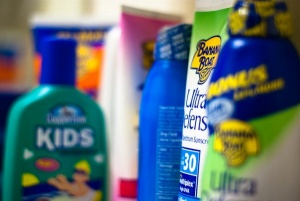 I confess, this is my top reason for writing this post.
I confess, this is my top reason for writing this post.
I can't tell you how many times I've been lounging at the beach or pool only to be blitzed by an unavoidable cloud of spray sunscreen. With a slight breeze, this can happen from all the way across the pool, folks.
You may be holding your breath while spraying, but that doesn't mean your neighbors who are lounging or playing have their nostrils, mouth, and eyes shrouded from your pollution.
If you read through this whole post and you still decide to spray, please do everyone a favor and do it at home, or at least in an empty bathroom where you're not sharing your dirty business with others.
#5 – Tree-hugger or not, you care about the environment
Thankfully, aerosol sprays may no longer contain chlorofluorocarbons (also known as CFCs), which were phased out in the 90s for causing holes in the stratospheric ozone layer. More good news: most spray sunscreen cans are recyclable – as long as your can is empty when it is discarded.
BUT, all sunscreens – even the waterproof kind – rinse off your skin when you are in the water (not to mention spray all over your surroundings).
In the case of chemical sunscreens, many of these ingredients are non-biodegradable. In the ocean, these substances settle on marine life and coral reefs, bleaching the coral as well as suffocating and sickening the various life forms. In fact, according to the Environmental Heath Perspectives Journal, 4,000 to 6,000 tons of sunscreen transfer from swimmers' bodies annually on the reefs. Some areas have instituted laws to prohibit sunscreens that are not biodegradable.
Even if you're not swimming in tropical locales, the sunscreen that you wash off your body while showering will go in a septic system or in a municipal waste system. Most water treatment facilities are not equipped to remove all non-biodegradable chemicals, so many substances end up back in our water supply and/or polluting our groundwater.
Spray sunscreens may not be eating away at the ozone layer, but they certainly aren't doing the environment any favors.
#6 – You can make (or buy) healthy sunscreen instead
Here's the deal: Aside from my selfish desires to avoid inhaling toxic chemicals, you really shouldn't put anything on your skin that isn't safe to eat. Flip over a can of spray sunscreen, and I can guarantee the ingredients won't be found on anyone's menu.
So what's a sun-lover to do on a long, gorgeous day where there's no shade to hide?
For starter's invest in a good, wide-brimmed hat – this one is my favorite. You'll also want a good umbrella – we have this one and these 2-in-1 umbrella chairs. Kids do great with rash guards, like this one for girls or this one for boys.
As for sunscreen, my first choice is my very own recipe for water-resistant, all-natural sunscreen that is made with skin-safe, non-nano zinc oxide, cocoa butter, coconut oil and other healthy ingredients. Get the recipe here.
Homemade sunscreen is unbelievably easy and affordable to make, but if you're not feeling up to the task? You can check out the safety rating of your sunscreen on the EWG site. This is my favorite brand of sunscreen that you can buy online.
Whatever your choose – homemade or store-bought – there's no excuse to spray.
Still confused about the dangers of spray sunscreen?
Leave your questions below!




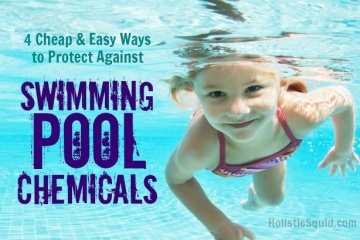
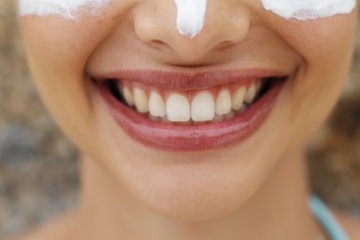



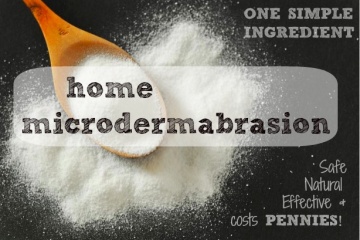

This happened yesterday at the pool to us. I saw somewhere that there is a warning (ban even?) against spray sunscreens, and yet they are still on the market. Anyway, thank you thank you thank you!
Here it is! This was floating around my Facebook feed a couple of days ago. It’s a warning, but hopefully it’s a start. http://www.wsfa.com/story/25792544/spray-on-sunscreens-may-pose-potential-risks-to-young-children
Love the post! Just an FYI, Badger Balm does contain gluten and is processed on equipment that processes peanuts. Major bummer but definitely worth mentioning to people with CD or allergies!
“Badger Balm does contain gluten and is processed on equipment that processes peanuts” — so don’t eat it!
That sounds good, but if you have an allergy, putting it on your skin can be just as much of a problem as eating it. It gets absorbed into your body through your skin.
Truth Fairy, some people are highly sensitive to these ingredients. If put on the skin, they can still be absorbed into the body, causing a reaction. Even breathing them in can cause a reaction. It is a scary thing for those who have these serious allergies. Something I learned in the past few years from being around my nephew who has nut allergies. (Typed in a gentle tone. :))
This reply seems sarcastic! Some people are SO sensitive to these allergens that they can be effected by the absorption through the skin.
Thanks for the tip Andrea, as I have a hyper-sensitive allergenic child who cannot stand having gluten containing products smeared on her!
This happened to us while driving in the car…we were turning a corner at a park and this guy was standing at the corner in this cloud of smoke, spraying sunscreen everywhere…it actually went in to the car. My husband and I coughed and held our breath; there wasn’t enough time to roll up the window. So, yeah, folks spraying that chemical mess are quite oblivious to how it affects others…like smokers.
I have a natural spray sunscreen (Goddess Garden Organics). Active ingredients are zinc oxide and titanium dioxide. Is that just as much of a problem?
I just learned recently that titanium dioxide is a heavy metal and not safe at all…so I now avoid it.
What about Green Goddess Spray sunscreen? Do you see any problems using this product?
http://shop.goddessgarden.com/kids-natural-sunscreen-spray-spf30-8oz/
Thank you for the good read!
oops sorry its called goddess garden 🙂
Excellent article, Emily! I’ve been having some of these same thoughts lately as I spray myself with hairspray, too. Definitely sharing this with my moms group on Facebook.
Hi Emily,
I just wondered what other natural sunscreens you would recommend other than the Badger one you speak of, as I’ve been searching for it but believe it’s been discontinued in the UK 🙁 or do you know of somewhere I could buy it in the UK?
Thank you 🙂
I was at the beach this past weekend and couldn’t get past how many parents were spraying their kids with spray sunscreen. Even if they’re not concerned about the chemical aspect, only half of it ends up on the kid and like you mentioned, there’s the risk of inhaling it. Another aspect that I think is worth bringing up is that this is contributing to the culture of “it’s not okay to touch kids.” Anyone who’s a teacher, child care worker, science camp instructor, etc. has been lectured that you should avoid physical contact with kids, pretty much at all cost. I think that it’s important to teach boundaries and to make sure kids know what is appropriate and what isn’t, and when they need to tell someone about it.
Thanks for reinforcing this issue! I have always thought inhaling this spray was in no way good!!! Definitely ditching this method!!!
Did it really take this article to finally convince you that inhaling a chemical product out of a spray was maybe not good?!?